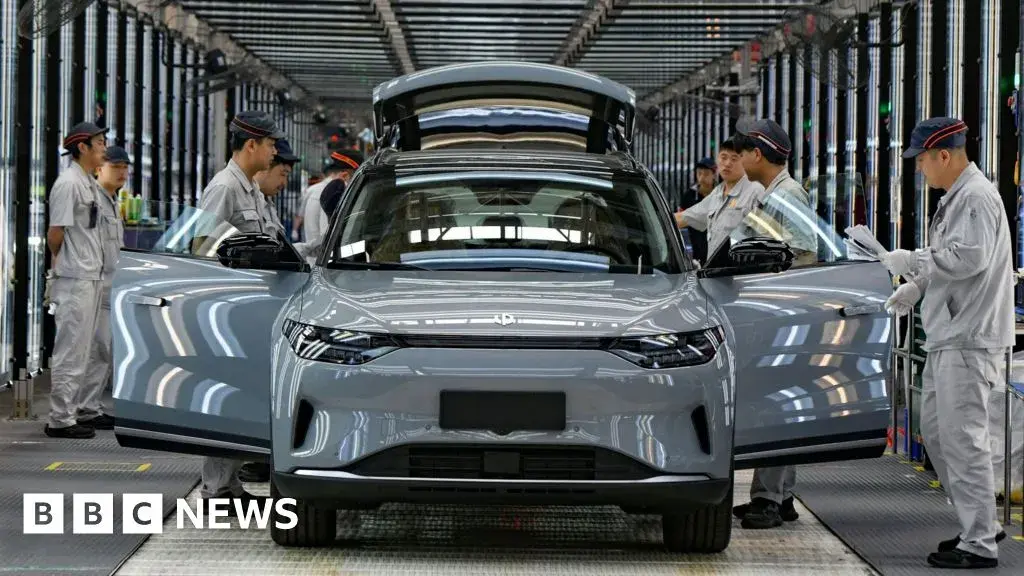President Joe Biden has been urged to ban imports of Chinese-made electric cars to the US.
The chair of the Senate Banking Committee, Senator Sherrod Brown, wrote “Chinese electric vehicles are an existential threat to the American auto industry”.
His comments are the strongest yet by any US lawmaker on the issue, while others have called for steep tariffs to keep Chinese electric vehicles (EV) out of the country.
In February, the White House said the US was opening an investigation into whether Chinese cars pose a national security risk. At the time, President Biden said that China’s policies “could flood our market with its vehicles, posing risks to our national security” and that he would “not let that happen on my watch.”



The major problem here is that China is offering prices below production costs aiming to ruin foreign competition. Once the objective of a monopoly-like market is reached, they can increase the price.
China’s domestic market has already seen a heavy price war leaving many EV companies in financial troubles (and, consequently, leaving buyers often without the possibilty of software maintenance and other after-sales services).
Baidu’s brand WM Motor, for example, ran out of liquidity last year, as well as Tencent’s Aiways. Other brands like Levdeo or Singulato filed for bankruptcy if I remember that right.
[Edit typo.]
The major problem here is that the US is owned by the oil industry and they will never allow competitive EVs to be built here. The US could easily match what China’s doing, but those subsidies go to oil instead.
The U.S. as well as Europe should definitely shift subsidies away from fossil fuels to renewables, and their industries could technologically keep up with China’s. However, it wouldn’t solve the problem here imo, as China has a structural overcapacity across the whole supply chain.
In a nutshell, China will do everything to flood the market with ever cheaper products. Its state policy has always been incentivizing lower prices for larger market share, but this policy has reached unprecedented levels (and not just in EV car market, btw.).
A major reason for this is Beijing’s bias against a ‘social welfare’ state for the benefit of industry subsidies. During the pandemic, the government provided high company subsidies to keep people employed, but no household support (which left and is still leaving domestic consumption low). The federal and local governments provided their subsidies irrespective of firms’ profitability. Knowing that the Chinese state-planned system traditionally rewards the mentioned scale of business over financial health, firms increased their production capacities even more, hoping to compensate lower margins with volume.
The result is now a massive and increasing overcapacity that can’t be absorbed by the domestic market.
Sorry for the long post.
Not with the unions in the US they can’t. Part of the reason China is able to produce cheap cars is because they have cheap labor.
Including widespread use of slave labor. It doesn’t get any cheaper.
Are you referring to prison labor?
I’m referring to Chinese slave labor, which is not even remotely comparable to American prison labor.
The US has roughly 0.3% of it’s population as slave labor. China has 0.4%. That looks pretty comparable to me
Just to check your numbers:
5.8 million slaves in China in 2021 (0.41%).
800,000 prison laborers in America that same year (0.24%).
For as flawed as the American judicial and prison systems are, they are not even remotely as awful as China’s - and neither is the labor performed by American prison laborers compared to China’s slaves. They are not the same. Chinese slaves aren’t even given a trial - they are just randomly picked off the street and forced to work themselves to death.
https://worldpopulationreview.com/country-rankings/countries-that-still-have-slavery
800 000 isn’t the total count of slaves in the US
Thanks for the extra info!
Do we have any real evidence of that?
@TanyaJLaird@beehaw.org
One more recent investigation by Rhomberg Group refers to China’s overcapacity and calling it ‘structural’, saying that
Another new study by German researchers in Kiel on Chinese subsidies has been posted by someone here just today on Lemmy.
We have been observing a massive price war within China’s domestic EV market for some time. Many EV car producer have already filed for bankruptcy or are on tbe bring of collapse. Consequently, many Chinese customers are unable to access after-sales and software maintenance services.